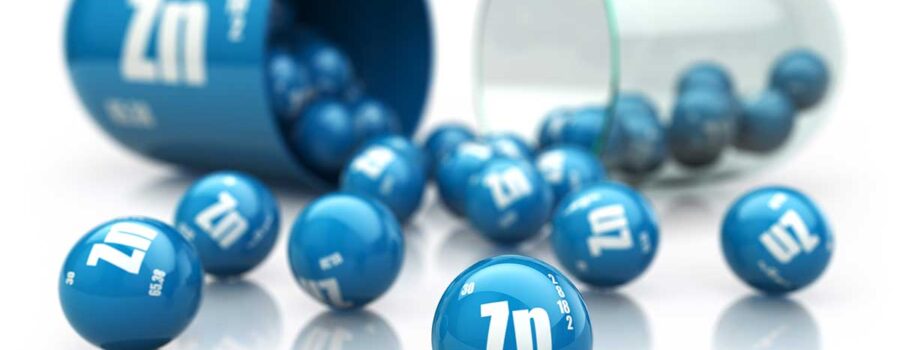Skin health reflects our overall well-being, and achieving a radiant complexion involves more than just topical treatments. It requires nurturing from within, and this is where zinc, an essential trace mineral, plays a crucial role. Beyond its well-known benefits for the immune system, zinc is integral to skin health, influencing cell growth, inflammation control, and acne management. This article delves deep into the skin-enhancing virtues of zinc, a true unsung hero in the realm of skincare.
What is Zinc?
Zinc is more than just a mineral; it’s a vital component necessary for numerous biochemical processes in the human body. It’s found in every cell and is crucial for the functioning of over 300 enzymes.[1] As a trace mineral, zinc is required in small amounts, yet its impact on health, particularly skin health, is substantial. The body doesn’t produce or store zinc, so regular intake through diet or supplements is essential for maintaining adequate levels.
Zinc’s Multifaceted Role in Skin Health
Cell Growth and Repair: A Closer Look
Zinc’s role in cell division and growth is fundamental for skin health. It’s a component of DNA polymerase, an enzyme critical for DNA synthesis, ensuring skin cells replicate accurately and heal optimally.[2] Zinc also aids in producing collagen, a key protein for skin elasticity and firmness.[3] This makes it particularly important in wound healing, as it accelerates tissue regeneration and helps maintain the skin’s structural integrity.
Anti-Inflammatory Powerhouse
Inflammation is the root of many skin issues, from acne to eczema. Zinc’s anti-inflammatory properties are a game-changer in dermatology. It works by inhibiting the NF-kB pathway, a molecular pathway that triggers inflammation.[4] In conditions like acne, rosacea, and dermatitis, zinc can reduce redness, swelling, and irritation, soothing the skin.
Acne Management: Zinc’s Dual Action
Zinc’s role in acne management is multifaceted. Firstly, it regulates the activity of oil glands, reducing sebum production, which can lead to acne. Secondly, its antimicrobial properties inhibit the growth of acne-causing bacteria, Propionibacterium acnes.[5] Moreover, zinc reduces keratinocyte activation – cells that produce keratin can block pores and exacerbate acne. Its ability to reduce inflammation also helps minimize acne breakouts’ severity.
Dietary Sources of Zinc: A Guide
Incorporating zinc-rich foods into your diet is key to leverage zinc’s skin benefits. Here’s a closer look at some of the best sources:
- Meat and Poultry: Beef, pork, lamb, and chicken are excellent sources. They provide highly bioavailable zinc, meaning the body more easily absorbs it.
- Seafood: Oysters are exceptionally high in zinc. Other good sources include crab, lobster, and shrimp.
- Legumes: Beans, lentils, and chickpeas are great plant-based sources, though the zinc in legumes is less bioavailable due to the presence of phytates.
- Nuts and Seeds: Pumpkin seeds, cashews, and almonds provide zinc and healthy fats that benefit skin health. The zinc is more available when nuts and seeds are traditionally prepared through soaking and sprouting.
- Dairy: Cheese and milk are good zinc sources as well
Supplements: When Diet Isn’t Enough
While a balanced diet can provide adequate zinc, some individuals may require supplements. Zinc gluconate, zinc sulfate, and zinc acetate are common forms. It’s crucial to consult a healthcare provider before supplementing, as excessive zinc intake can lead to adverse effects and imbalances in other trace minerals.
Zinc in Skincare Products: Topical Benefits
The inclusion of zinc in skincare formulations is increasingly popular thanks to its protective and healing properties. Zinc oxide, for example, is a staple in sunscreens, providing physical UV barriers. It’s also found in creams and ointments for its soothing effects on irritated or damaged skin.
Navigating Zinc Intake: Safety and Recommendations
The recommended daily allowance (RDA) for zinc varies. For adults, it’s 11 mg for men and 8 mg for women, with increased needs during pregnancy and lactation. Exceeding these amounts can lead to nausea, headaches, and imbalances in other minerals. Consistent and balanced intake is key to harnessing zinc’s benefits without adverse effects.
Zinc7
The rediscovery of the power of Zinc is one of the most important breakthroughs in the history of modern nutrition. 
Because research—REAL HUMAN RESEARCH—has already shown it can:
- Significantly boost immunity (knowing you’re better protected)
- Help you fall asleep faster and stay asleep (wake up refreshed)
- Lose weight faster on the same amount of calories (a must-have for health metabolism)
- Boost hormone health, sex drive, and performance (both men and women!)
- Protect your liver against carcinogens and toxins (keep “fatty liver” away)
- And even transform your gums and teeth (stop bleeding, decay, and keep them whiter)
Conclusion: Embracing Zinc for Skin Wellness
Zinc’s contribution to skin health is undeniable. Its involvement in cell growth, anti-inflammatory action, and acne management makes it a vital nutrient for anyone seeking a healthy and vibrant complexion. By integrating zinc-rich foods into your diet and considering zinc-based skincare products, you can enjoy the full spectrum of benefits this essential mineral offers
References:
- Nazanin Roohani, Richard Hurrell, Roya Kelishadi, and Rainer Schulin.Zinc and its importance for human health: An integrative review.2013 Feb; 18(2): 144–157.PMCID: PMC3724376.PMID: 23914218
- R S MacDonald.The role of zinc in growth and cell proliferation.2000 May;130(5S Suppl):1500S-8S. doi: 10.1093/jn/130.5.1500S.PMID: 10801966.DOI: 10.1093/jn/130.5.1500S
- Liane Bolke, Gerrit Schlippe, Joachim Gerß, and Werner Voss.A Collagen Supplement Improves Skin Hydration, Elasticity, Roughness, and Density: Results of a Randomized, Placebo-Controlled, Blind Study.2019 Oct; 11(10): 2494.2019 Oct 17. doi: 10.3390/nu11102494.PMCID: PMC6835901.PMID: 31627309
- Ananda S. Prasad.Zinc is an Antioxidant and Anti-Inflammatory Agent: Its Role in Human Health.2014; 1: 14.2014 Sep 1. Prepublished online 2014 Jun 9. doi: 10.3389/fnut.2014.00014.PMCID: PMC4429650.PMID: 25988117
- Zubaidah Al-Khafaji, Sofia Brito,and Bum-Ho Bin.Zinc and Zinc Transporters in Dermatology.2022 Dec; 23(24): 16165.2022 Dec 18. doi: 10.3390/ijms232416165.PMCID: PMC9785331.PMID: 36555806


